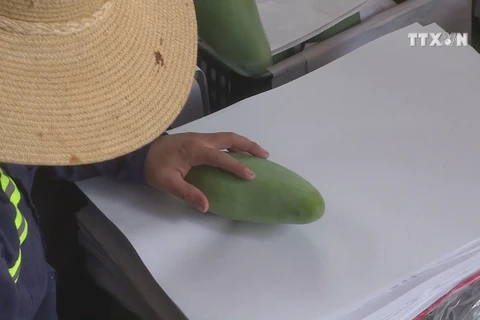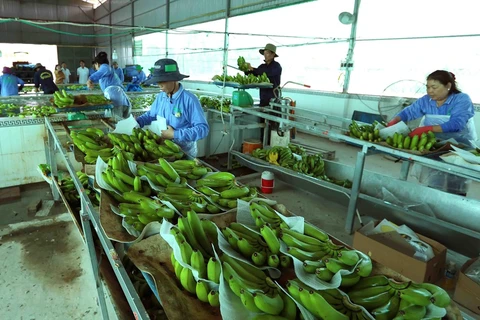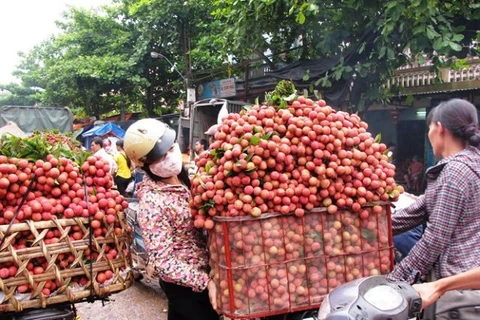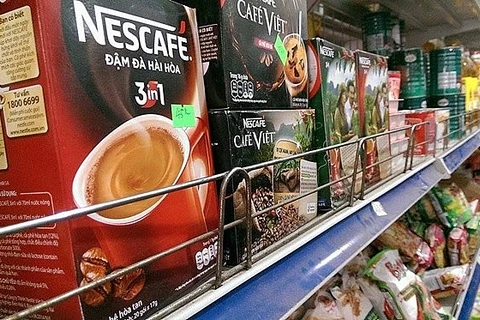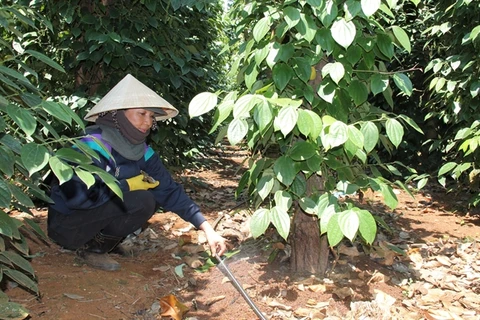HCM City (VNS/VNA) - Some 400 pomelo, durian and coffee farmers from Highlands, South-eastern and Mekong Delta provinces are attending seven classes for advanced training in agronomy, cultivation techniques and integrated pest management.
The classes at the recently launched Bayer Agricademy, organised from June 7 to 22, aim to help the farmers improve yields, quality and incomes to achieve the ultimate goal of the Government to improve the quality of agricultural products that are exported.
Much More Durian and Much More Pomelo via Much More Fruits Clubs were taught to local farmer technical solutions.
The courses on pomelo equipped farmers with advanced knowledge and remedies for root rot disease while those on durian will focus on young fruit drop phenomenon.
These are common diseases in the Mekong Delta and south-eastern regions that currently lack effective solutions.
As for coffee farming, the course teaches farmers high-tech solutions for successful coffee replanting.
Vo Van Bay from Long Tien commune, Cai Lay district, Tien Giang province, one of the trainees, said: “In the near future, durian will be exported officially, putting an end to the sluggish trade and the fact that supply exceeds demand.
“Durian is currently sold at 60,000 VND per kilogramme, but export prices could be two or three times higher though there will be stringent quality requirement.
“Therefore, if farmers would like to benefit from export, we need to upgrade our knowledge, applying modern farming methods to qualify for export, which we can do thanks to Bayer Agricademy.”
Talking about the training, Le Quoc Dien, Director of the Southern Horticultural Research Institute’s Technology Transfer Centre, said: “The training programme provides practical information including about crop management and pest management with the aim of helping Vietnamese farmers improve productivity and quality.
“Lectures and handbooks are designed and edited with illustrations and topics tailored to make it easy for farmers to understand and apply after learning.”
Bayer Vietnam said it welcomes feedback from participants while exploring farmers’ needs and cooperating with partners to offer more courses for farmers around the country.
Weraphon Charoenpanit, country commercial lead of Bayer Vietnam’s Crop Science Division, said: “We would like to help every farmer become an expert on their own farms, enjoying higher yields, quality and incomes. In addition, farmers participating in this advanced training will be trainers playing an important role in helping neighbouring farmers improve their cultivation.”
Bayer also offers farmers who are members of the Bayer Much More Fruits Clubs the opportunity to interact with farmers in neighbouring countries through its annual Beautiful Fruit Gardens competition.
Ten winners of last year’s competition will go on a field trip to mango and custard apple farms in Thailand from July 24 to 27.
Vietnam has for many long been a competitive fruit exporter with increasing exports.
The Ministry of Agriculture and Rural Development said in recent years fruit exports have seen a jump in growth.
In 2012, fruit and vegetable exports were only worth 800 million USD. In 2016, this figure had surged to 2.4 billion USD. Last year they were worth 3.8 billion USD.
In early 2019, Vietnam’s fruit exporters received the good news that China had agreed to allow imports of seven fruits from Vietnam, including durian, pomelo, passion fruit, sweet potato, coconut, custard apple, and mangosteen.
The ministry said 10 billion USD worth of fruit exports could be achieved soon.
But to be more competitive in the export market, Vietnam needs to underline its capability to supply high-quality products since most of its farmers are small holders using traditional methods of cultivation.
Therefore, supplying quality products and establishing a value chain are urgent requirements for the country’s fruit industry to enter all markets, experts said.-VNS/VNA
The classes at the recently launched Bayer Agricademy, organised from June 7 to 22, aim to help the farmers improve yields, quality and incomes to achieve the ultimate goal of the Government to improve the quality of agricultural products that are exported.
Much More Durian and Much More Pomelo via Much More Fruits Clubs were taught to local farmer technical solutions.
The courses on pomelo equipped farmers with advanced knowledge and remedies for root rot disease while those on durian will focus on young fruit drop phenomenon.
These are common diseases in the Mekong Delta and south-eastern regions that currently lack effective solutions.
As for coffee farming, the course teaches farmers high-tech solutions for successful coffee replanting.
Vo Van Bay from Long Tien commune, Cai Lay district, Tien Giang province, one of the trainees, said: “In the near future, durian will be exported officially, putting an end to the sluggish trade and the fact that supply exceeds demand.
“Durian is currently sold at 60,000 VND per kilogramme, but export prices could be two or three times higher though there will be stringent quality requirement.
“Therefore, if farmers would like to benefit from export, we need to upgrade our knowledge, applying modern farming methods to qualify for export, which we can do thanks to Bayer Agricademy.”
Talking about the training, Le Quoc Dien, Director of the Southern Horticultural Research Institute’s Technology Transfer Centre, said: “The training programme provides practical information including about crop management and pest management with the aim of helping Vietnamese farmers improve productivity and quality.
“Lectures and handbooks are designed and edited with illustrations and topics tailored to make it easy for farmers to understand and apply after learning.”
Bayer Vietnam said it welcomes feedback from participants while exploring farmers’ needs and cooperating with partners to offer more courses for farmers around the country.
Weraphon Charoenpanit, country commercial lead of Bayer Vietnam’s Crop Science Division, said: “We would like to help every farmer become an expert on their own farms, enjoying higher yields, quality and incomes. In addition, farmers participating in this advanced training will be trainers playing an important role in helping neighbouring farmers improve their cultivation.”
Bayer also offers farmers who are members of the Bayer Much More Fruits Clubs the opportunity to interact with farmers in neighbouring countries through its annual Beautiful Fruit Gardens competition.
Ten winners of last year’s competition will go on a field trip to mango and custard apple farms in Thailand from July 24 to 27.
Vietnam has for many long been a competitive fruit exporter with increasing exports.
The Ministry of Agriculture and Rural Development said in recent years fruit exports have seen a jump in growth.
In 2012, fruit and vegetable exports were only worth 800 million USD. In 2016, this figure had surged to 2.4 billion USD. Last year they were worth 3.8 billion USD.
In early 2019, Vietnam’s fruit exporters received the good news that China had agreed to allow imports of seven fruits from Vietnam, including durian, pomelo, passion fruit, sweet potato, coconut, custard apple, and mangosteen.
The ministry said 10 billion USD worth of fruit exports could be achieved soon.
But to be more competitive in the export market, Vietnam needs to underline its capability to supply high-quality products since most of its farmers are small holders using traditional methods of cultivation.
Therefore, supplying quality products and establishing a value chain are urgent requirements for the country’s fruit industry to enter all markets, experts said.-VNS/VNA
VNA

